
On computers, a serial port is a serial communication interface through which information transfers in or out sequentially one bit at a time. This is in contrast to a parallel port, which communicates multiple bits simultaneously in parallel. Throughout most of the history of personal computers, data has been transferred through serial ports to devices such as modems, terminals, various peripherals, and directly between computers.
XScale is a microarchitecture for central processing units initially designed by Intel implementing the ARM architecture instruction set. XScale comprises several distinct families: IXP, IXC, IOP, PXA and CE, with some later models designed as system-on-a-chip (SoC). Intel sold the PXA family to Marvell Technology Group in June 2006. Marvell then extended the brand to include processors with other microarchitectures, like Arm's Cortex.

The OMAP family, developed by Texas Instruments, was a series of image/video processors. They are proprietary system on chips (SoCs) for portable and mobile multimedia applications. OMAP devices generally include a general-purpose ARM architecture processor core plus one or more specialized co-processors. Earlier OMAP variants commonly featured a variant of the Texas Instruments TMS320 series digital signal processor.
The O2 Xda brand was a range of Windows Mobile PDA phones, marketed by O2, developed by O2 Asia and manufactured by multiple OEMs (mainly HTC, Quanta and Arima). The first model was released in June 2002. The last models came to market in 2008. The "X" represents convergence of voice and information/data within one product; the "DA" stands for "Digital Assistant", as in PDA. The name of XDA Developers is derived from it.
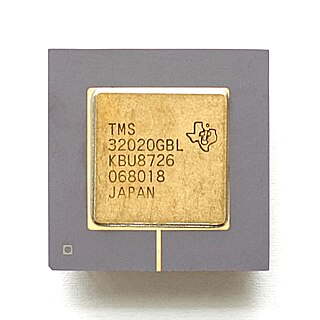
Texas Instruments TMS320 is a blanket name for a series of digital signal processors (DSPs) from Texas Instruments. It was introduced on April 8, 1983 through the TMS32010 processor, which was then the fastest DSP on the market.
ARM9 is a group of 32-bit RISC ARM processor cores licensed by ARM Holdings for microcontroller use. The ARM9 core family consists of ARM9TDMI, ARM940T, ARM9E-S, ARM966E-S, ARM920T, ARM922T, ARM946E-S, ARM9EJ-S, ARM926EJ-S, ARM968E-S, ARM996HS. Since ARM9 cores were released from 1998 to 2006, they are no longer recommended for new IC designs, instead ARM Cortex-A, ARM Cortex-M, ARM Cortex-R cores are preferred.

The HP Compaq TC1100 is a tablet PC sold by Hewlett-Packard that was the follow-up to the Compaq TC1000. The TC1100 had either an Intel Celeron or an Intel Pentium M chip set and could be upgraded up to 2 gigabytes of memory. The switch from Transmeta Crusoe processors to the Pentium M and the ability to add memory was welcomed after numerous complaints about the poor performance of the TC1000. The TC1100 was the last version from HP in this style of tablet. It was replaced by the HP Compaq TC4200, which featured a more traditional one-piece design.

The Pandora is an operating system, handheld game console and mobile personal computer originally released in 2010. It is designed to take advantage of existing free and open-source software and to be a target for homebrew development. It includes several features that no handheld game consoles have previously had, making it a cross between a handheld game console and a subnotebook. It is developed and produced by OpenPandora, which is made up of former distributors and community members of the GP32 and GP2X handhelds. Until 2013, multiple batches of slightly updated Pandora variants were produced. In 2014 the development of a redesigned and upgraded successor, called DragonBox Pyra, was started.

The BeagleBoard is a low-power open-source single-board computer produced by Texas Instruments in association with Digi-Key and Newark element14. The BeagleBoard was also designed with open source software development in mind, and as a way of demonstrating the Texas Instrument's OMAP3530 system-on-a-chip. The board was developed by a small team of engineers as an educational board that could be used in colleges around the world to teach open source hardware and software capabilities. It is also sold to the public under the Creative Commons share-alike license. The board was designed using Cadence OrCAD for schematics and Cadence Allegro for PCB manufacturing; no simulation software was used.
The Archos Generation 6 (Gen6) product series is represented by misc "Internet Media Tablets" or "IMT", e.g. the Archos 5 Internet Media Tablet This series of tablet computers developed by the French company Archos that features a resistive touchscreen for video, photo, audio, internet browsing and other multimedia applications. The individual numbering of the distinct models seems up to now to roughly resemble the length of the display diagonal in inches.

The Gdium is a subnotebook / netbook computer produced by EMTEC. The Gdium product is distinguished by its unique Loongson MIPS processor and the use of a USB key as a primary storage device. The Gdium netbook is marketed as an interface device to the Gdium "learning community"—a website that provides hardware support, MIPS builds of open-source software, Linux computing tips, and educational resources targeted towards teachers and students within the K-12 demographic.
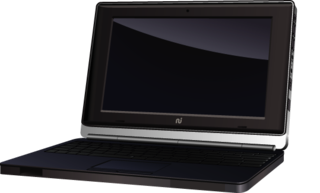
The Touch Book is a portable computing device that functions as a netbook, and a tablet computer. Designed by Always Innovating, a company situated in the city of Menlo Park, in California, USA, it was launched at the DEMO conference in March 2009. Its designers stated at launch that it is the first netbook featuring a detachable keyboard with a long battery life. It is based on the ARM TI OMAP3530 processor and features a touchscreen.

The PandaBoard was a low-power single-board computer development platform based on the Texas Instruments OMAP4430 system on a chip (SoC). The board has been available to the public at the subsidized price of US$174 since 27 October 2010. It is a community supported development platform.
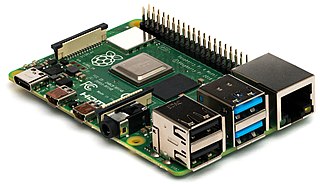
Raspberry Pi is a series of small single-board computers (SBCs) developed in the United Kingdom by the Raspberry Pi Foundation in association with Broadcom. The Raspberry Pi project originally leaned toward the promotion of teaching basic computer science in schools. The original model became more popular than anticipated, selling outside its target market for uses such as robotics. It is widely used in many areas, such as for weather monitoring, because of its low cost, modularity, and open design. It is typically used by computer and electronic hobbyists, due to its adoption of the HDMI and USB standards.
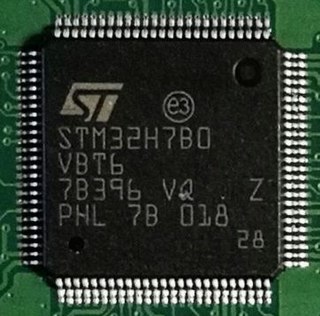
STM32 is a family of 32-bit microcontroller integrated circuits by STMicroelectronics. The STM32 chips are grouped into related series that are based around the same 32-bit ARM processor core: Cortex-M0, Cortex-M0+, Cortex-M3, Cortex-M4, Cortex-M7, Cortex-M33. Internally, each microcontroller consists of ARM processor core(s), flash memory, static RAM, debugging interface, and various peripherals.

The Sitara Arm Processor family, developed by Texas Instruments, features ARM9, ARM Cortex-A8, ARM Cortex-A9, ARM Cortex-A15, and ARM Cortex-A53 application cores, C66x DSP cores, imaging and multimedia acceleration cores, industrial communication IP, and other technology to serve a broad base of applications. Development using Sitara processors is supported by the open source Beagle community as well as Texas Instruments' open source development community.
XMC is a family of microcontroller ICs by Infineon. The XMC microcontrollers use the 32-bit RISC ARM processor cores from ARM Holdings, such as Cortex-M4F and Cortex-M0. XMC stands for "cross-market microcontrollers", meaning that this family can cover due to compatibility and configuration options, a wide range in industrial applications. The family supports three essential trends in the industry: It increases the energy efficiency of the systems, supports a variety of communication standards and reduces software complexity in the development of the application's software environment with the parallel released eclipse-based software tool DAVE.
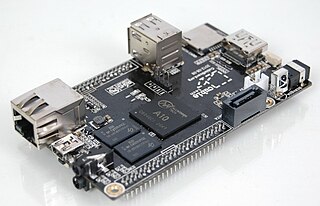
Cubieboard is a single-board computer, made in Zhuhai, Guangdong, China. The first short run of prototype boards were sold internationally in September 2012, and the production version started to be sold in October 2012. It can run Android 4 ICS, Ubuntu 12.04 desktop, Fedora 19 ARM Remix desktop, Armbian, Arch Linux ARM, a Debian-based Cubian distribution, FreeBSD, or OpenBSD.
ISEE is a European multinational company that designs and manufactures small computer-on-modules (COMs), single-board computers, expansion boards, radars and other embedded systems. The abbreviation of ISEE refers to Integration, Software & Electronics Engineering. Their products are based on the IGEP Technology, the ISEE Generic Enhanced Platform using Texas Instruments OMAP processors.














